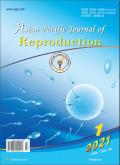卵泡液、阴道拭子和导管尖端微生物培养与体外受精β-hCG阳性和阴性的关系
IF 0.6
Q4 REPRODUCTIVE BIOLOGY
引用次数: 1
摘要
目的:探讨微生物污染与体外受精(IVF)中β-人绒毛膜促性腺激素(β-hCG)阳性和阴性的关系。方法:对73例新鲜IVF周期妇女进行回顾性研究。在取卵和胚胎移植前收集阴道拭子培养样本。取卵时采集卵泡液,胚胎移植成功后采集导管尖端培养标本。胚胎移植14天后,将女性分为体外受精(IVF)阳性和阴性。对体外受精(IVF) β-hCG阳性和阴性妇女的好氧微生物培养报告进行比较统计分析。结果:73例女性中,体外受精β-hCG阳性42例(57.5%),阴性31例(43.5%)。在取卵阴道拭子、卵泡液、胚胎移植阴道拭子和导管针尖的有氧培养中,粪肠球菌高于其他细菌(链球菌、念珠菌、大肠杆菌和克雷伯氏菌)。在体外受精阳性与阴性的比较中,体外受精阴性妇女在取卵和胚胎移植过程中阴道拭子培养总体微生物感染率高于体外受精阳性妇女(38.71% vs. 28.57%);但差异无统计学意义(P < 0.05)。IVF阳性妇女的卵泡液和导管尖端培养物微生物感染率略高于IVF阴性妇女(分别为54.76%比41.94%和19.05%比9.68%),但差异无统计学意义(P < 0.05)。结论:卵泡液、阴道拭子培养、导管尖端培养的需氧微生物培养报告与体外受精β-hCG阳性无统计学意义。本文章由计算机程序翻译,如有差异,请以英文原文为准。
Association of the microbial culture of follicular fluid, vaginal swab and catheter tip with β–hCG IVF positive and negative
Objective: To find out the association of microbial contamination with β-human chorionic gonadotropin ( β-hCG) in-vitro fertilization (IVF) positive and negative. Methods: A total of 73 fresh IVF cycle women were included in the retrospective study. Vaginal swab culture samples were collected prior to ovum pick-up and embryo transfer. The follicular fluids were collected during ovum pick-up and catheter tip culture samples were collected after successful embryo transfer. After 14 days of the embryo transfer, women were classified into β-hCG IVF positive and negative. The comparative statistical analyses of aerobic microbial culture reports were done between β-hCG IVF positive and negative women. Results: Out of 73 women, 42(57.5%) were found to be β-hCG IVF positive and 31(43.5%) were negative. In the aerobic culture of ovum pick-up vaginal swab, follicular fluid, embryo transplantation vaginal swab and catheter tip, Enterococcus faecalis was found to be higher compared to other bacteria (Streptococcus spp., Candida, Escherichia coli and Klebsiella). Regarding the comparison between IVF positive and negative, the overall microbial infection rate of vaginal swab culture during ovum pick-up and embryo transplantation was found to be higher in IVF negative women than in IVF positive women (38.71% vs. 28.57%); however, it was not statistically significant (P>0.05). The follicular fluid and catheter tip culture microbial infection rate was found to slightly higher in IVF positive women than in IVF negative women (54.76% vs. 41.94% and 19.05% vs. 9.68%, respectively), but there were not significant differences (P>0.05). Conclusions: The aerobic microbial culture reports of follicular fluid, vaginal swab culture, and catheter tip culture are not statistically significantly with β-hCG IVF positive.
求助全文
通过发布文献求助,成功后即可免费获取论文全文。
去求助
来源期刊

Asian Pacific Journal of Reproduction
Veterinary-Veterinary (all)
CiteScore
1.70
自引率
0.00%
发文量
588
审稿时长
9 weeks
期刊介绍:
The journal will cover technical and clinical studies related to health, ethical and social issues in field of Gynecology and Obstetrics. Articles with clinical interest and implications will be given preference.
 求助内容:
求助内容: 应助结果提醒方式:
应助结果提醒方式:


